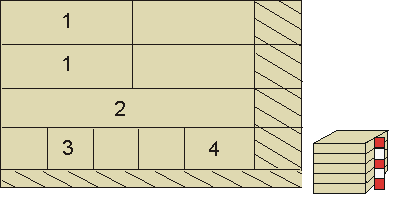

Determines the frequency of labels
There are several choices per piece, per cycle etc.
Runs - Consider the following run. Board quantity=30 : Book height=5 : Cycles=6

Number of 1 produced = 120
Number of 2 produced = 30
Number of 3 produced = 120
Number of 4 produced = 30
1 - per piece
With per piece a label is produced for every piece of material. In the above example this means that there are:-
120 labels for part 1
30 labels for part 2
120 labels for part 3
30 labels for part 4
2 - per cycle
With per cycle a label for each cycle of the saw (each book of material). In the above example this would produce the following labels:-
24 labels for part 1
6 labels for part 2
24 labels for part 3
6 labels for part 4
3 - in a fixed multiple
Fixed multiple refers to the material as it is stored around the saw after cutting (destacking). With this option the number of labels produced is determined from the multiple. For example if the multiple is 25 a label is produced for every 25 parts. In the example above this would give:-
5 labels for part 1
2 labels for part 2
5 labels for part 3
2 labels for part 4
The multiple is set by the parameter Value of Fixed Multiple. This frequency is not available if you have chosen Pattern Sequence as the sequence.
4 - per pallet
5 - per stack
These options produce one label per pallet or one label per stack. These options are only available with the Destacking module.
Labels for Quotes and Orders or Product Requirements - in these cases the labels are for list of items in the Order or product requirements and the frequency is applied to the quantity of the item. For example:-
Frequency=1 - label per item
Product Quantity No of labels
PRODUCT A 9 9
PRODUCT B 5 5
Frequency=3 - label per multiple
(where multiple = 4)
Product Quantity No of labels
PRODUCT A 9 3
PRODUCT B 5 2
Notes
- A list of items for a Quote or order may include both products and individual parts
- Where the parameter: Sequence is set to Patterns only Per piece and Per cycle should be entered for Frequency